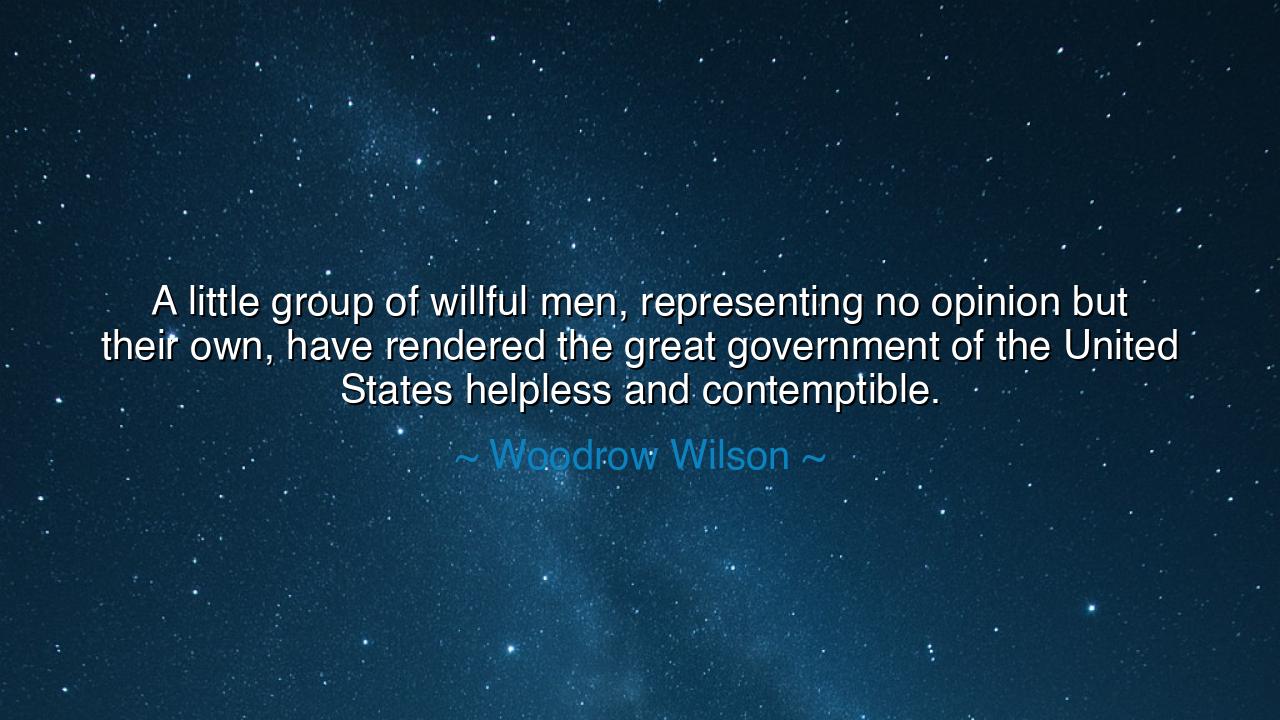
A little group of willful men, representing no opinion but their
A little group of willful men, representing no opinion but their own, have rendered the great government of the United States helpless and contemptible.






"A little group of willful men, representing no opinion but their own, have rendered the great government of the United States helpless and contemptible." — Woodrow Wilson
Hear these words, O children of liberty, and let them echo through your hearts as the warning of one who once held the highest trust of a free people. Woodrow Wilson, the 28th President of the United States, spoke them not in peace but in frustration — in a moment when the machinery of democracy had been seized by obstinate men. When he said, “A little group of willful men, representing no opinion but their own, have rendered the great government of the United States helpless and contemptible,” he laid bare one of the oldest dangers in the republic: that when power falls into the hands of the proud and unyielding few, the will of the many is silenced, and the voice of the nation becomes a whisper.
The meaning of this quote reaches deep into the heart of governance itself. Wilson speaks of obstruction, that deadly poison which seeps into the arteries of democracy when ambition outweighs duty. He warns that even the grandest institutions — even a government built on freedom and law — can be brought to paralysis by the stubborn will of a small, selfish minority. These “willful men,” as he calls them, act not in service to the people but in service to themselves, caring more for pride than principle, more for power than for the nation’s good. When such men rise unchecked, the might of the state becomes feeble, and the faith of the people falters.
The origin of these words lies in a stormy chapter of American history. It was the year 1917. The world was at war, and the fires of conflict raged across Europe. President Wilson, seeking to lead the United States with dignity and purpose, called upon Congress to act — to protect the seas, to prepare for war, to defend the honor of the nation. But in the Senate, a handful of men stood in defiance, blocking his efforts. They did not represent the will of the people, nor the call of conscience, but only their own obstinate beliefs. Their resistance made the government appear weak and divided at a moment when unity was most needed. It was then, in anger and sorrow, that Wilson spoke these immortal words — not against the opposition of ideas, but against the betrayal of responsibility.
History is filled with such moments, when small groups of the willful few bring great nations to their knees. In ancient Rome, the Senate once held the fate of an empire in its grasp, yet factions and personal ambition tore it apart. Men who sought glory above service turned the Republic into chaos, and Caesar crossed the Rubicon, ending a democracy that had lasted for centuries. Likewise, in every age, the few who mistake their will for wisdom threaten the many who trust in the rule of law. Wilson’s words are thus both a cry of his own time and a timeless truth — that democracy’s strength lies not in the loudness of individuals, but in the harmony of its people.
Yet there is a second meaning woven into Wilson’s lament, one more profound and subtle. His words remind us that democracy is fragile not only because of its enemies, but because of its stewards. A system meant to serve all can be captured by the self-serving, and the institutions of freedom can be turned against their very purpose. The helplessness of a government, Wilson implies, is not born of weakness, but of corruption of spirit — when those entrusted with power forget that it is not theirs to wield, but theirs to guard. The “little group” may be small, but their pride and defiance weigh heavier than the will of millions.
From this truth emerges a lesson for every age and every citizen. The health of a republic does not depend only on presidents or parliaments, but on the virtue of those who serve and the vigilance of those who are served. When leaders act for themselves rather than for the people, it is the duty of the people to remind them whom they represent. And when the machinery of democracy is stalled by vanity and division, it is the duty of all to repair it — through engagement, through voice, through vote. For a government rendered “helpless and contemptible” can only recover its strength when the people themselves reclaim its purpose.
So, my friends, take heed of Wilson’s warning. Beware the willful few who place themselves above the common good. Beware also the complacency that allows them to reign unchecked. In every council, in every age, there will be those who seek to bend the nation’s will to their own. Stand against them, not with anger alone, but with courage, unity, and the faith that truth belongs not to one man, nor one party, but to all who love justice. For democracy, though mighty, is a delicate flame — and it can be extinguished as easily by the arrogance of the few as by the indifference of the many. Let us, then, guard it as sacred, and ensure that never again can a handful of men make the great government of the people appear small before the world.






AAdministratorAdministrator
Welcome, honored guests. Please leave a comment, we will respond soon